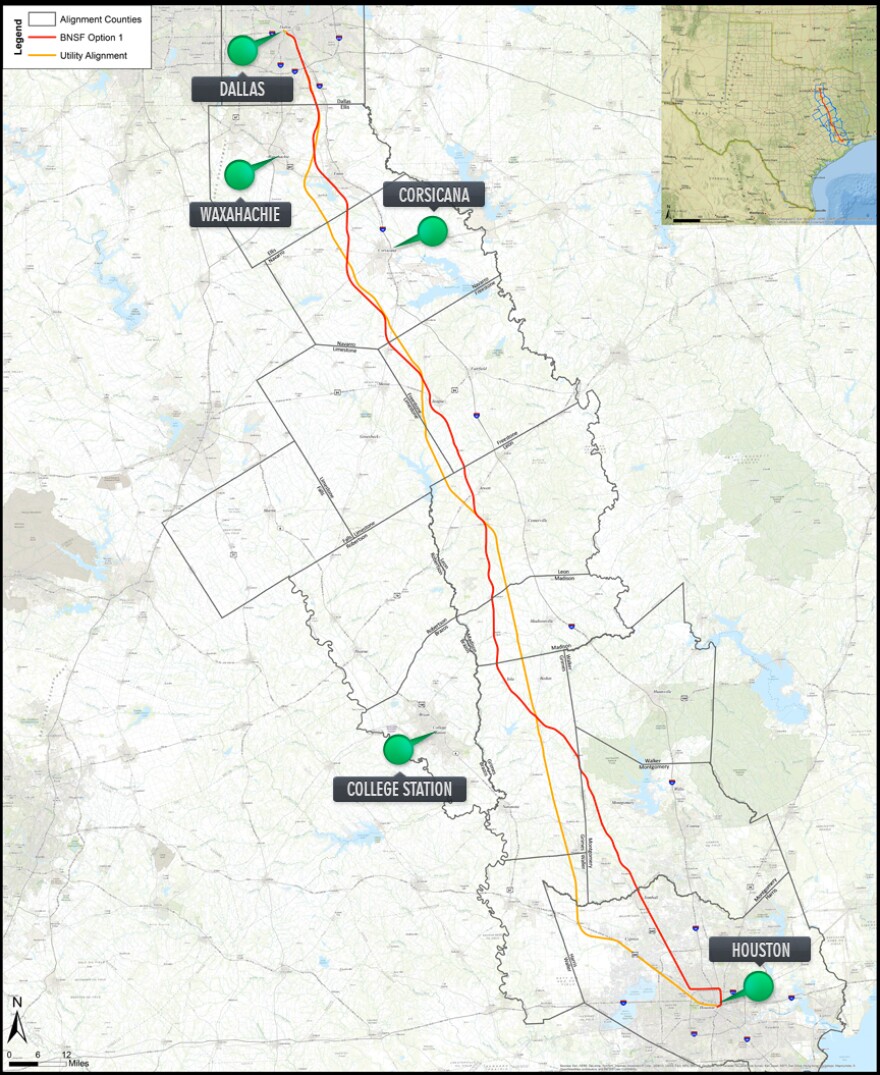A proposed bullet train between Dallas and Houston has run into a couple of potential roadblocks: landowners in rural Texas and legislators in Austin.
Many would argue that the quiet, sleepy countryside of Ennis is no place for the commotion of a N700 series Shinkansen bullet train.
David Hunter, for instance, is one of them. He’s dedicated the past 30 years to building his family’s dream home on a 40-acre plot in the rural town south of Dallas. He says what makes Texas distinguishable is its land.
But the Dallas-to-Houston high-speed rail might change that for Hunter’s family and the many families who live on the projected route. He says while the train’s plans have rapidly materialized over the past year, he, like many others in Ennis, have been living in limbo.
Both potential pathways -- a utility corridor and an existing right-of-way owned by BNSF Railway -- would slice through his land. One might even cut through his house.
“You really want it to come through your house; you don’t want it to come beside it,” Hunter said, chuckling at the irony. “Because you’ll get more for your property. If it comes over here 200 feet, well then, we’re still sitting here, but then we’ve got a high-speed rail coming every 30 minutes or however they propose to run the trains.”
Six years from now, in 2021, Texas Central Railway hopes to have its bullet trains coming and going 62 times a day. The company says its tracks will be no wider than 100 feet and will need just about 3,000 acres to run between Dallas and Houston. The trip would be about 90 minutes.
Video: Watch a bullet train promotional video from Texas Central Railway
https://www.youtube.com/watch?t=154&v=k6igUibrfwc
'Not a good thing for Texas'
Rural landowners fear much more than just losing their land: Diminishing property values, spending taxpayer money on a private project and using eminent domain to buy residents out of their homes for a train they say they won’t even ride.
“It’s not a good thing for Texas,” Hunter said. “It destroys a bunch of property, homes, farms and ranches that will never be the same.”
That’s the argument being used by a group called Texans Against High Speed Rail. They’ve spent the current legislative session in Austin trying to kill the $10 billion project. And they’ve had some success.
The Texas Senate plans to vote on a bill that would strip high-speed rail companies of eminent domain authority. And, last weekend, a condition was quietly added to the state budget that could limit the Texas Department of Transportation's involvement in the project -- effectively eliminating needed knowledge and oversight. If either of those measures survives House and Senate votes, the bullet train could be stopped altogether.
Republican John Wray represents Ennis in the State House. He authored three of his own bills that won’t make it to the floor this session: One that required consent from all affected counties and another that mandated private companies to pay damages a third that essentially prohibited private entities from accessing public funds.
“If we can’t stop the project, I at least want to make sure that my district -- and all the districts that are similarly situated -- are treated as favorably as they can possibly be treated,” Wray said. “The phrase I’ve been using is it creates a 'Chinese Wall' of sorts, and that would really impact landowners as well as future development all along that pathway.”
Train will be 'really good for the state'
Texas Central has said those kinds of characterizations and the legislative moves are unfair.
“I think that the issue with the train is that it’s a high-speed train, and that’s new -- not only to Texas but new to the country,” said Kathryn Kaufman, executive vice president of Texas Central Railway. “So when you don't know something and you haven't experienced it, you may tend to have a little fear about it, and that's why we have tried to be as transparent and open and educational as possible.”
When the first train of the now-famous Shinkansen network launched in 1964, it was met with fierce opposition, technical difficulties and astronomical costs. The $80 million project had become the bane of Japan.
But when it finally pulled out of Tokyo Station, it became a symbol of change that transformed Japan’s cities. Kaufman argues the train will do the same here.
“This is something that’s really good for the state. We wouldn’t be doing it if we didn’t believe it was transformational and something really important for the state,” Kaufman said.
'An emotional factor'
If the rail pulls through, Ennis lawyer Gary Bennett says his firm will be representing landowners.
“Even though they may still have use of the properties, it may be a diminished use, and they should be compensated for that,” he said. “There’s an emotional factor involved; if it comes through someone’s house, they’ve got to move.”
On his serene homestead out in Ennis, that’s exactly what’s got David Hunter worried.
“You know, we’ve got this place and built it after 30 years of work, and now there’s a chance that we might lose it," he said. "You know we’re 58 years old, and so it’s basically starting over.”
If the bullet train survives this legislative session, the next step for Texas Central will be finishing an environmental impact study that’s due in June.
From Dallas to Houston, two potential routes for high-speed rail

Learn more
In 2013, KERA reported on plans for the bullet train. Explore the story.






